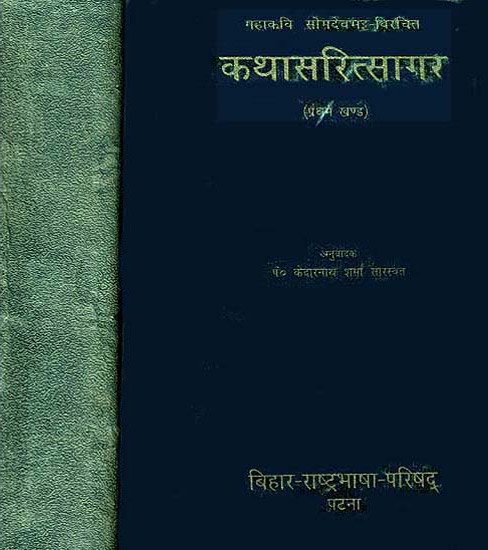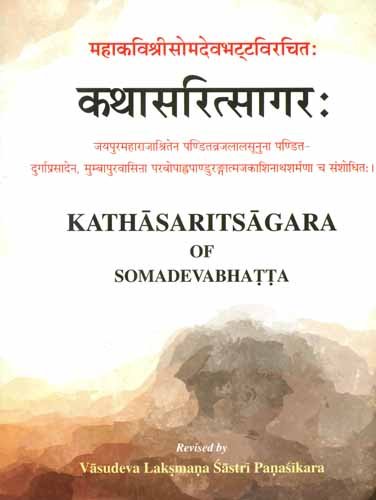Kathasaritsagara [sanskrit]
by C. H. Tawney | 2014 | 226,424 words | ISBN-13: 9789350501351
The Sanskrit edition of the Kathasaritsagara referencing the English translation and grammatical analysis. Written by Somadeva and dating from the 12th century, the Kathasaritsagara (or Katha-sarit-sagara) represents an epic legend narrating the adventures of Naravahanadatta as he strives to become the destined emperor of the Vidyadharas. Alternative titles: (Kathāsaritsāgara, कथासरित्सागर, Kathā-sarit-sāgara)
Verse 17.6.212
तामाकण्य ययुस् ततः प्रमुदितास्ते ब्रह्मशक्रादयः शापान्मुक्तवता तपोधनमुनिः शिष्येण साकं ययौ ।
श्रीमुक्ताफलकेतुना च सहितो भार्याद्वयभ्राजिना पुत्रेणाथ स चन्द्रकेतुरगमद्वैद्याधरं स्वं पदम् ॥ २१२ ॥
tāmākaṇya yayus tataḥ pramuditāste brahmaśakrādayaḥ śāpānmuktavatā tapodhanamuniḥ śiṣyeṇa sākaṃ yayau |
śrīmuktāphalaketunā ca sahito bhāryādvayabhrājinā putreṇātha sa candraketuragamadvaidyādharaṃ svaṃ padam || 212 ||
The English translation of Kathasaritsagara Verse 17.6.212 is contained in the book The Ocean of Story by C.H. Tawney. This book is available online or you could buy the latest edition:
Read online Buy now! The English translation by C.H. Tawney (2014)
Glossary of Sanskrit terms
Note: This extracts Sanskrit terms and links to English definitions from the glossary, based on an experimental segmentation of verse (17.6.212). Some terms could be superfluous while some might not be mentioned. Click on the word to show English definitions.
Tamaka, Nya, Yayu, Tatah, Tad, Tata, Pramudita, Yushmad, Brahma, Brahman, Shakra, Aya, Ayas, Shapa, Muktavat, Tapodhana, Muni, Shishya, Sakam, Saka, Yayi, Shri, Ukta, Aphalaka, Sahitri, Sahita, Bharya, Vaya, Bhrajin, Putra, Atha, Candraketu, Vaidyadhara, Sva, Pada,
Analysis of Sanskrit grammar
Note: this is an experimental feature and only shows the first possible analysis of the Sanskrit text (Kathasaritsagara Verse 17.6.212). If the system was successful in segmenting the sentence, you will see of which words it is made up of, generally consisting of Nouns, Pronouns, Verbs, Participles and Indeclinables. Click on the link to show all possible derivations of the word.
- Line 1: “tāmākaṇya yayus tataḥ pramuditāste brahmaśakrādayaḥ śāpānmuktavatā tapodhanamuniḥ śiṣyeṇa sākaṃ yayau ”
- tāmāka -
-
tāmāka (noun, masculine)[compound], [vocative single]tāmāka (noun, neuter)[compound], [vocative single]
- ṇya -
-
ṇya (noun, masculine)[compound], [vocative single]
- yayus -
-
yayu (noun, masculine)[nominative single]yayu (noun, feminine)[nominative single]√yā (verb class 2)[perfect active third plural]
- tataḥ -
-
tataḥ (indeclinable adverb)[indeclinable adverb]tataḥ (indeclinable correlative)[indeclinable correlative]tataḥ (indeclinable)[indeclinable]tad (noun, neuter)[ablative single], [ablative dual], [ablative plural]tata (noun, masculine)[nominative single]√tan -> tata (participle, masculine)[nominative single from √tan class 8 verb]sa (noun, masculine)[ablative single], [ablative dual], [ablative plural]sā (noun, feminine)[ablative single], [ablative dual], [ablative plural]
- pramuditās -
-
pramudita (noun, masculine)[nominative plural], [vocative plural]pramuditā (noun, feminine)[nominative plural], [vocative plural], [accusative plural]
- te -
-
ta (noun, masculine)[locative single]ta (noun, neuter)[nominative dual], [vocative dual], [accusative dual], [locative single]tā (noun, feminine)[nominative dual], [vocative single], [vocative dual], [accusative dual]tad (noun, neuter)[nominative dual], [accusative dual]sa (noun, masculine)[nominative plural]sā (noun, feminine)[nominative dual], [accusative dual]yuṣmad (pronoun, none)[dative single], [genitive single]
- brahma -
-
brahma (noun, masculine)[compound], [vocative single]brahma (noun, neuter)[compound], [vocative single]brahman (noun, neuter)[compound], [adverb], [nominative single], [vocative single], [accusative single]√brahm (verb class 1)[imperative active second single]
- śakrād -
-
śakra (noun, masculine)[adverb], [ablative single]śakra (noun, neuter)[adverb], [ablative single]
- ayaḥ -
-
ayas (noun, neuter)[compound], [adverb], [nominative single], [vocative single], [accusative single]aya (noun, masculine)[nominative single]i (noun, masculine)[nominative plural], [vocative plural]e (noun, masculine)[nominative plural], [vocative plural], [accusative plural]
- śāpān -
-
śāpa (noun, masculine)[adverb], [accusative plural], [ablative single]
- muktavatā -
-
√muc -> muktavat (participle, masculine)[instrumental single from √muc class 6 verb]√muc -> muktavat (participle, neuter)[instrumental single from √muc class 6 verb]√muc -> muktavat (participle, masculine)[instrumental single from √muc class 1 verb]√muc -> muktavat (participle, neuter)[instrumental single from √muc class 1 verb]√muj -> muktavat (participle, masculine)[instrumental single from √muj class 1 verb]√muj -> muktavat (participle, neuter)[instrumental single from √muj class 1 verb]
- tapodhana -
-
tapodhana (noun, masculine)[compound], [vocative single]tapodhana (noun, neuter)[compound], [vocative single]
- muniḥ -
-
muni (noun, masculine)[nominative single]
- śiṣyeṇa -
-
śiṣya (noun, masculine)[instrumental single]śiṣya (noun, neuter)[instrumental single]√śās -> śiṣya (participle, masculine)[instrumental single from √śās class 2 verb]√śās -> śiṣya (participle, neuter)[instrumental single from √śās class 2 verb]√śiṣ -> śiṣya (participle, masculine)[instrumental single from √śiṣ class 10 verb]√śiṣ -> śiṣya (participle, neuter)[instrumental single from √śiṣ class 10 verb]
- sākam -
-
sākam (indeclinable)[indeclinable]sāka (noun, neuter)[adverb], [nominative single], [accusative single]
- yayau -
-
yayi (noun, masculine)[locative single]yayi (noun, feminine)[locative single]yayu (noun, masculine)[locative single]yayu (noun, feminine)[locative single]√yā (verb class 2)[perfect active first single], [perfect active third single]
- Line 2: “śrīmuktāphalaketunā ca sahito bhāryādvayabhrājinā putreṇātha sa candraketuragamadvaidyādharaṃ svaṃ padam ”
- śrīm -
-
śrī (noun, feminine)[accusative single]
- uktā -
-
ukta (noun, masculine)[compound], [vocative single]ukta (noun, neuter)[compound], [vocative single]uktā (noun, feminine)[nominative single]√vac -> ukta (participle, masculine)[vocative single from √vac class 2 verb], [vocative single from √vac class 3 verb]√vac -> ukta (participle, neuter)[vocative single from √vac class 2 verb], [vocative single from √vac class 3 verb]√vac -> uktā (participle, feminine)[nominative single from √vac class 2 verb], [nominative single from √vac class 3 verb]
- āphalake -
-
āphalaka (noun, masculine)[locative single]
- tunā -
-
- ca -
-
ca (indeclinable conjunction)[indeclinable conjunction]ca (noun, masculine)[compound], [vocative single]ca (noun, neuter)[compound], [vocative single]
- sahito* -
-
sahitṛ (noun, masculine)[vocative single]sahita (noun, masculine)[nominative single]√sah -> sahita (participle, masculine)[nominative single from √sah class 1 verb], [nominative single from √sah class 10 verb]
- bhāryād -
-
bhārya (noun, masculine)[adverb], [ablative single]bhārya (noun, neuter)[adverb], [ablative single]√bhṛ -> bhārya (participle, masculine)[adverb from √bhṛ]√bhṛ -> bhārya (participle, neuter)[adverb from √bhṛ]√bhṛ -> bhārya (participle, masculine)[ablative single from √bhṛ]√bhṛ -> bhārya (participle, neuter)[ablative single from √bhṛ]
- vaya -
-
vaya (noun, masculine)[compound], [vocative single]ve (noun, masculine)[compound]√vay (verb class 1)[imperative active second single]
- bhrājinā -
-
bhrājin (noun, masculine)[instrumental single]bhrājin (noun, neuter)[instrumental single]
- putreṇā -
-
putra (noun, masculine)[instrumental single]putra (noun, neuter)[instrumental single]
- atha -
-
atha (indeclinable)[indeclinable]
- sa -
-
sa (noun, neuter)[compound], [vocative single]sa (noun, masculine)[nominative single]
- candraketur -
-
candraketu (noun, masculine)[nominative single]
- agamad -
-
√gam (verb class 1)[aorist active third single]√gam (verb class 2)[aorist active third single]√gam (verb class 3)[aorist active third single]
- vaidyādharam -
-
vaidyādhara (noun, masculine)[adverb], [accusative single]vaidyādhara (noun, neuter)[adverb], [nominative single], [accusative single]
- svam -
-
sva (noun, masculine)[adverb], [accusative single]svan (noun, masculine)[adverb]svan (noun, neuter)[adverb]sva (noun, neuter)[nominative single], [accusative single]
- padam -
-
pada (noun, neuter)[adverb], [nominative single], [accusative single]
Other editions:
Also see the following editions of the Sanskrit text or (alternative) English translations of the Kathasaritsagara Verse 17.6.212
Kathasaritsagar
by Kedarnath Sharma Saraswat (2005)
The Only Edition with the Sanskrit Text and its Hindi Translation (An Old and Rare Book) Set of 3 Vol.
Buy now!
Kathasaritsagara of Somadeva Bhatta (Sanskrit Text Only)
by Vasudeva Laksmana Sastri (2013)
Katha Sarit Sagar in Marathi
by H. A Bhave (1995)
Set of 5 Volumes; Published by Varada Books, Pune. 2256 pages (Throughout B/W Illustrations).
Buy now!
Katha Sarit Sagara (Tamil)
by S. V. Ganapati (எஸ். வி. கணபதி) (2014)
[கதா சரித் சாகரம்] Published by Alliance Publications.
Buy now!
Galpa Shono
by Abhijit Chattopadhyay (2014)
[গল্প শোনো] Galpa Shono: Bengali Translation of 'Suno Kahani From Katha Sarit Sagar'; 9788126015436; Published by Sahitya Akademi, Delhi.
Buy now!Preview of verse 17.6.212 in Bengali sript:
তামাকণ্য যযুস্ ততঃ প্রমুদিতাস্তে ব্রহ্মশক্রাদযঃ শাপান্মুক্তবতা তপোধনমুনিঃ শিষ্যেণ সাকং যযৌ ।
শ্রীমুক্তাফলকেতুনা চ সহিতো ভার্যাদ্বযভ্রাজিনা পুত্রেণাথ স চন্দ্রকেতুরগমদ্বৈদ্যাধরং স্বং পদম্ ॥ ২১২ ॥
![Kathasaritsagara [sanskrit] - book cover](/uploads/a/Katha-Sarit-Sagara.jpg)




